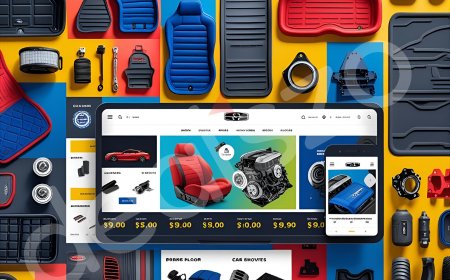Boost Your Car’s Lifespan with Timely Tune-Ups
Keeping your vehicle running smoothly isn’t just about fixing problems when they occur—it’s about preventing them.

Keeping your vehicle running smoothly isnt just about fixing problems when they occurits about preventing them. Thats where regular tune-ups come in. A timely tune-up can enhance your cars performance, improve fuel efficiency, and save you money in the long run. If you're unsure about when or why your car needs one, you're in the right place. In this article, well explore everything you need to know about car tune-ups, signs you shouldn't ignore, and how to maximize your vehicle's lifespan with simple maintenance practices.
What Is a Car Tune-Up?
A car tune-up is a comprehensive inspection and servicing of the engine and other essential components to ensure everything is functioning as it should. It usually involves checking or replacing spark plugs, fuel filters, air filters, and ignition components. In modern vehicles, tune-ups may also include software updates or diagnostics via the cars onboard computer system.
In older cars, tune-ups were needed more frequently due to wear-and-tear-prone mechanical systems. Todays cars are more sophisticated, but routine maintenance is still key to avoiding costly repairs.
Signs Your Car Might Need a Tune-Up
Knowing when to get a tune-up can save you time and prevent more serious issues. Watch out for these common warning signs:
-
Decreased fuel efficiency: A sudden drop in miles per gallon can signal that the engine isn't running as efficiently as it should.
-
Difficulty starting: Trouble getting your car to start could point to ignition problems or worn-out spark plugs.
-
Unusual noises: Knocking, pinging, or other strange engine sounds often indicate internal issues that a tune-up can address.
-
Rough idling: If your car vibrates or shakes when idle, it may be due to misfiring spark plugs or dirty fuel injectors.
-
Warning lights: The check engine light is one of the clearest signs its time for a professional evaluation.
If any of these symptoms sound familiar, it's a good idea to schedule an auto tune up service before the issue worsens.
Whats Included in a Tune-Up?
While every vehicle is different, most tune-ups will include:
-
Replacing spark plugs and wires
-
Inspecting and replacing air and fuel filters
-
Testing the battery and charging system
-
Inspecting belts and hoses for wear
-
Fuel system cleaning
-
Checking the engine timing and idle
These services are aimed at keeping the engine running cleanly and efficiently. Neglecting them could lead to reduced performance and potentially more expensive repairs down the road.
How Often Should You Get a Tune-Up?
This depends on your cars make, model, and age. Many newer vehicles can go 30,000 to 100,000 miles without needing a traditional tune-up. However, that doesnt mean theyre maintenance-free. Check your owners manual or consult with a certified mechanic to determine the right schedule.
For older cars, a tune-up may be required every 10,00020,000 miles. Weather conditions, driving habits, and vehicle usage also affect how frequently you should seek maintenance.
Benefits of Routine Vehicle Tune-Ups
Regular tune-ups offer multiple benefits beyond just preventing breakdowns:
-
Improved fuel economy: Clean filters and properly functioning spark plugs help your engine run more efficiently.
-
Enhanced engine performance: A well-maintained engine starts easier, runs smoother, and produces more power.
-
Reduced emissions: Tune-ups help keep your vehicle environmentally friendly by minimizing harmful exhaust.
-
Longer engine life: Regular checkups can catch small issues before they develop into major problems.
If you're wondering whether it's worth investing in a vehicle tune up, the answer is almost always yesespecially if you want to avoid costly repairs and maintain resale value.
DIY vs. Professional Tune-Ups
Some basic maintenance, like changing air filters or checking fluid levels, can be done at home. However, modern engines require specialized diagnostic tools and expertise, especially when dealing with sensors, onboard computers, and emission systems.
Unless you're experienced with car maintenance, its best to leave the comprehensive tune-up to professionals. They have the tools and know-how to perform diagnostics and identify potential issues that may not be obvious.
Final Thoughts
Taking your car in for regular tune-ups isnt just a recommendationits a necessity. The benefits of improved performance, fuel savings, and a longer vehicle lifespan far outweigh the costs. Pay attention to warning signs, stick to your manufacturers maintenance schedule, and dont overlook routine inspections.
Before planning your next service, be sure to schedule a Vehicle Inspection to get a clear overview of your cars condition. Its a small step that can make a huge difference in keeping your car reliable, efficient, and road-ready for years to come.






































